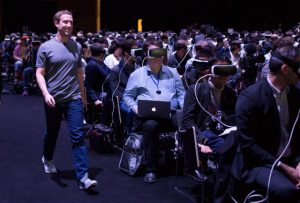 Imagine a world where virtual reality is not the preserve of wealthier tech geeks and where entering a VR simulation does not require all the expensive paraphernalia we currently need in order to be able to benefit from the technology. And within the context of the gambling industry, imagine a world where playing casino games in realistic setting does not necessarily mean playing at a physical casino.
Imagine a world where virtual reality is not the preserve of wealthier tech geeks and where entering a VR simulation does not require all the expensive paraphernalia we currently need in order to be able to benefit from the technology. And within the context of the gambling industry, imagine a world where playing casino games in realistic setting does not necessarily mean playing at a physical casino.
During this year’s edition of Oculus Connect, an annual event organized by Facebook’s VR division Oculus VR, Mark Zuckerberg promised that it will not be long before the above-described scenarios become reality. During the conference, the tech billionaire detailed his company’s first standalone headset Oculus Go. The new all-in-one product will not require any PC or wires and will also feature built-in audio, which means that it will not require headphones as well. And what is to be believed its best advantage, it will arrive at a price of US$199 with projected shipping from early 2018.
Here it is important to note that other tech giants have also been working on standalone products. Google is collaborating with HTC and Lenovo and is set to launch the all-in-one Daydream headset sometime next year.
During Oculus Connect 4, Zuckerberg also said that his VR company’s goal will be to bring 1 billion people to the world of virtual reality with much help from the Venues app that will be launched next year and will allow people from different parts of the world to watch together movie premieres as well as live concerts and sports events through the VR technology. And while the tech mogul has a proven record of success in bringing people together, the latest task he put before his team of VR wizards may take longer to be accomplished than Zuckerberg himself might wish.
With that said, it will also take a little more time before the benefits and immense opportunities the technology offers become truly available to casino players. There is almost no doubt that VR will catch on eventually and that it will be adopted by the gambling industry. However, here are several important points why we believe we are still at least several years away from this.
How Long Before VR Really Becomes a Thing?
 On a positive note, last year’s release of Oculus Rift capped several decades of false starts in the VR field. The subsequent launch of other headsets came as a long-anticipated affirmation that the technology is here to stay. And announcements that standalone products will soon see the light of day came as further affirmation and evidence that work has been done, that the technology has developed rapidly in recent years, and that it will develop even more and even faster in the next few years.
On a positive note, last year’s release of Oculus Rift capped several decades of false starts in the VR field. The subsequent launch of other headsets came as a long-anticipated affirmation that the technology is here to stay. And announcements that standalone products will soon see the light of day came as further affirmation and evidence that work has been done, that the technology has developed rapidly in recent years, and that it will develop even more and even faster in the next few years.
On a less positive note, the VR headsets did not particularly catch on with consumers or at least not to the extent developers had hoped for. Manufacturers are tight-lipped on how many headsets have been sold since Oculus Rift hit store shelves last spring and its counterparts were released later on. However, people with knowledge of the matter believe that there have been no more than several million pieces sold by the end of the summer.
And the fact that all major manufacturers have reduced their headsets’ prices significantly comes as good evidence to the above-stated. Oculus VR announced earlier this month its Rift product will sell permanently for US$399, or a third of its original price. The price of HTC’s VIVE VR System was reduced to US$599 from US$799. And PlayStation VR can now be bought for around US$300 (without a camera).
Price was probably one of the main reasons why headsets were not met by consumers as vividly as manufacturers had expected. The need for additional hardware is another such reason. And last but not least, the relative shortage of VR content should also be paid a bit more attention.
The technology’s applications are numerous – from the massive video games universe to health care. However, quality content is a must for the nascent technology to be gradually adopted by different fields. In terms of video gaming, there are thousands of VR titles. And even though the original hype from the launch of the first headsets had long worn out, developers are optimistic that the technology will eventually gain widespread popularity.
However, VR people believe that it will probably take one more generation of hardware and several more years before the technology is fit enough for the mass market. To end on a positive note, Oculus Go with its impulse-buy price range (for a digital product) and the other standalone headsets set to be unveiled next year are a bright signal that changes in the VR landscape are coming for sure, ones that will make the technology more affordable and will encourage more fields to adopt it.
VR in the World of Gambling
 Online gambling is a sector worth billions of dollars and it is bound to grow even further until it takes the largest global gambling industry share. First signs that this is going to happen (and probably not that far from now) have already begun appearing. Last year, iGaming became the largest segment of the UK gambling market and it is believed that very soon it will take the lead in other regulated jurisdictions.
Online gambling is a sector worth billions of dollars and it is bound to grow even further until it takes the largest global gambling industry share. First signs that this is going to happen (and probably not that far from now) have already begun appearing. Last year, iGaming became the largest segment of the UK gambling market and it is believed that very soon it will take the lead in other regulated jurisdictions.
The quick sophistication of hand-held devices was taken excellent advantage of by gambling industry masterminds and it was not long before mobile and tablet gaming and betting caught on with consumers and became a highly profitable trade for operators and developers of this type of content.
We are in a stage in the development of the gambling industry when millennials, that is the extremely demanding and tech-savvy generation of twenty- and thirty-somethings, are gradually becoming the main target of gaming and betting companies as they are into their prime earning years and it can be said that they are now wielding the most buying power.
And if there is one particular thing the millennial cohort is driven by and attracted to that would be innovation. Many believe that virtual reality holds the potential to become the next big thing in gambling, the technology that will invade the gambling landscape to change it drastically and forever.
With the launch of Oculus Rift last spring, the first VR online casino was brought to life by SlotsMillion. Players were presented with around 40 slots titles adapted to the VR technology. Upon logging into the casino, they are entering a lobby on the 80th floor of a futuristic skyscraper where they can pick a game and play for real money. Although the concept is quite innovative, it should be said that it still has a long way to go before changing the gambling industry drastically.
Popular developers of online gaming content, including Microgaming, which has been one of the oldest in the field, and NetEnt, have revealed virtual reality projects. For instance, NetEnt announced during this year’s edition of the ICE Totally Gaming show that its team of developers has been working on perfecting their knowledge of the VR technology and finding the best possible ways of deploying it within the online casino industry. The Swedish supplier of iGaming content is planning to make its first foray into the virtual reality world by developing a VR real-money version of one of its most popular titles – Gonzo’s Quest.
First steps toward introducing casino players to VR experience are clearly being made and it should be noted that efforts are primarily focused on slot games, as it can be said that they are the mainstream. However, table games are, too, quite a big vertical with customers who can readily spend big amounts of money. In other words, table games VR experience will probably be the next stage in the development of the online gambling industry.
A quick search on the Internet brings up free-to-play VR table game projects, but it can be said that these are all in their early stages of development.
Conclusion
Virtual reality is a technology with what many would describe as limitless potential and very promising future. However, it currently has few commercial applications mainly due to the fact that it is struggling to attract consumers and to offer diverse content.
And it can be said that the prices of VR headsets and the necessity for additional hardware are the main reasons why the technology has not hit the mainstream yet. But once this happens, it will be only a matter of time before it is introduced and applied in different industries and aspects of our life, including the global online gambling industry.



















